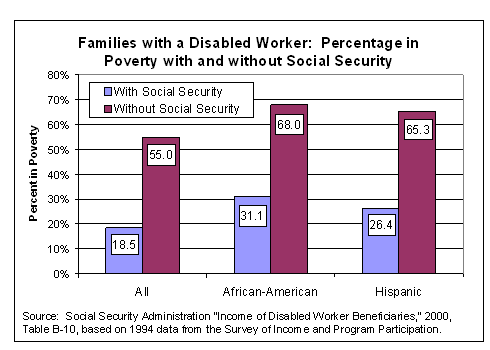Social Security privatization doesn't only threaten to push retired workers into poverty. It represents a great danger to more than 7.5 million disabled workers and their dependents who need Social Security Disability Insurance for survival.
Disability benefits are already meager -- the average benefit in December 2004 was just $894 per month -- but the President's Social Security commission wants to cut them as well as retirees' benefits to help pay for the costs of privatization (Russell, January 19, 2005). According to the American Association of Retired Persons, even with the current Social Security benefits, "[t]he poverty rate for families with a disabled worker is more than double that for families without a disabled worker: 18.5 percent compared with 9 percent" ("Social Security Disability Insurance: Some Facts"). See what the poverty rate of the disabled would be without Social Security benefits:
The proposed cuts in Social Security benefits range "from 19 percent to 47.5 percent after the year 2030" (Greg Anrig, Jr. and Bernard Wasow, "Twelve Reasons Why Privatizing Social Security Is a Bad Idea," December 14, 2004). In addition to cuts, eligibility rules may be made more restrictive to prevent the disabled from receiving or retaining disability benefits and thus cut the overall government expenditure on them. Worst of all, "Bush's Social Security commission also recommended that access to disability accounts prior to retirement age be barred," which "defeat[s] the purpose of SSDI entirely " (Russell, January 19, 2005).
Source: "Social Security Disability Insurance: Some Facts"
Neither individual accounts nor private insurance plans can compensate for reductions in benefits that privatization would bring: "[a]ccording to the General Accounting Office, in 1996, only 26 percent of private-sector employees had long-term disability coverage under employer-sponsored insurance plans. Work-related coverage has been shrinking not expanding since then"; and "[i]n January 2001, after examining a number of privatization plans, the General Accounting Office concluded, 'the income from (workers' individual accounts) was not sufficient to compensate for the decline in the insurance benefits that disabled beneficiaries would receive'" (emphasis added, Russell, January 19, 2005).
And who will benefit from bloodletting? Britain privatized its old-age pensions in the late 1980s, and now the verdict is in: "Britain’s experiment with substituting private savings accounts for a portion of state benefits has been a failure. A shorthand explanation for what has gone wrong is that the costs and risks of running private investment accounts outweigh the value of the returns they are likely to earn. On average, fees and charges can reduce pension lump sums by up to 30 percent on retirement" (emphasis added, Norma Cohen, "A Bloody Mess," The American Prospect Online, January 11, 2005).




No comments:
Post a Comment